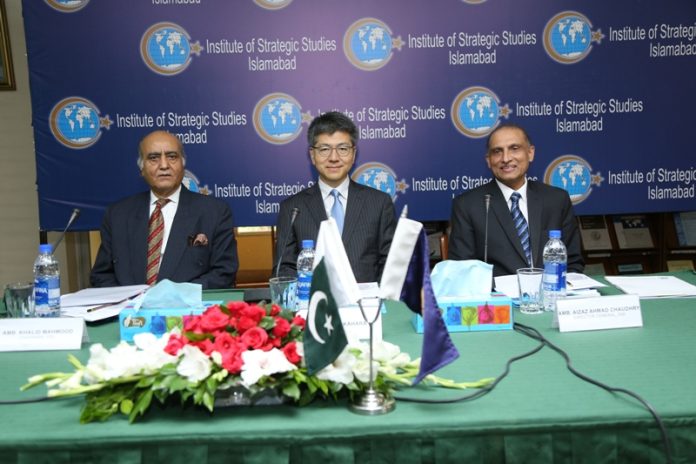Press Release
Public Talk
Belt and Road Initiative (BRI)& Free and Open Indo-Pacific (FOIP): Are They Compatible
September 30, 2019
“The BRI is a constellation. The concept of BRI is a diplomatic and political genius, an attractive constellation but in reality what matters to countries is the tangibility of the ‘stars’ (projects).” This was stated by Dr. Akio Takahara, Dean, Graduate School of Public Policy and Professor of Contemporary Chinese Politics at the Graduate Schools For Law and Politics, The University of Tokyo during his address at a Public Talk on ‘Belt and Road Initiative (BRI)& Free and Open Indo-Pacific (FOIP): Are They Compatible?’. The event was organized by the Institute of Strategic Studies Islamabad (ISSI), today under its Distinguished Lecture Series. Policy makers, diplomats, academics and students were present on the occasion.
While explaining the BRI in the context of Chinese foreign policy making, Dr. Akio Takahara said that President Xi Jinping wishes to stabilize big power relations, and avoid confrontation between a rising power and its hegemonic counterpart – alluding to the rapid decline in United States-China relations. He also talked about domestic and international impact of BRI. He said that the project while attracting great attention and “participation”; and an increase in investment and trade also raises concerns about the profitability of some projects and China’s strategic interests. He called this the ‘China Dilemma’. He pointed out that one pressing concern for many countries is the fear of falling into the ‘debt trap’ while repaying back Chinese loans. Another concern is the use of force, especially on the maritime front, including creation of artificial islands and militarizing them.
Dr. Takahara also spoke of the potential economic compatibility of the BRI with the FOIP. The key areas of FOIP include developing an environment for international peace, stability and prosperity, and sharing universal values; addressing global issues toward achieving the Sustainable Development Goals (SDGs), promoting human security and contributing to economic diplomacy and regional revitalization that aims at “quality growth”. If we focus on the economic concept of BRI , then the two concepts of BRI and FOIP can overlap, he said. In terms of response to the rise of BRI, Dr. Takahara said that countries should develop their network of security cooperation, link-up and promote basic principles such as free trade and rule of law, cooperate with China in developing Asia and Africa and conduct better public diplomacy towards the Chinese.
Earlier, in his welcome remarks, Ambassador Aizaz Ahmad Chaudhry, Director General ISSI, said that the world around us is in a flux. Asia, especially is home to a growing strategic competition between China and the United States. Both countries have put forth competing strategies for the future of the region. The BRI is meant to promote global trade, infrastructure and development and envisages more than a trillion dollars in investment, he said. Even though initially the United States watched the BRI grow, Washington soon started to push back so as to limit Chinese reach and hence, the United States embarked on an Indo-Pacific Strategy of its own. The two visions for Asia’s security are accelerating the United States-China competition, putting many Asian states in a difficult situation. For Pakistan, it brings forth new strategic challenges, which poses a major concern for policy makers, Ambassador Aizaz said.
Ambassador Khalid Mahmood, Chairman BOG, ISSI, in his concluding remarks said that countervailing initiatives to the BRI are disturbing trends because instead of trying to build upon and improve existing ventures, such initiatives aim to destroy development efforts. These, he said, are embedded in problems of governance. The solution remains in finding a common ground which can only be found in cooperation and avoiding confrontation.












